Darwin Medal
This article needs additional citations for verification. (January 2022) |
The Darwin Medal is awarded by the Royal Society every alternate year for "work of acknowledged distinction in the broad area of biology in which Charles Darwin worked, notably in evolution, population biology, organismal biology and biological diversity". First awarded in 1890, it was created in memory of Charles Darwin and is presented with a £2000 prize (as of 2016).[1]
Since its creation the medal has been awarded over 60 times, the recipients including Francis Darwin, Charles Darwin's son, and two married couples, Jack and Yolande Heslop-Harrison in 1982 and Peter and Rosemary Grant in 2002. The medal was first awarded to Alfred Russel Wallace, a noted biologist and naturalist who had independently developed the Theory of Evolution by Natural Selection.
List of recipients[]
| Year | Portrait | Name | Rationale | Ref. |
|---|---|---|---|---|
| 1890 | 
|
Alfred Russel Wallace | "For his independent origination of the theory of the origin of species by natural selection." | [2][3] |
| 1892 | 
|
Joseph Dalton Hooker | "On account of his important contributions to the progress of systematic botany, as evidenced by the 'Genera Plantarum' and the 'Flora Indica'; but more especially on account of his intimate association with Mr. Darwin in the studies preliminary to the 'Origin of Species'." | [4][5] |
| 1894 | 
|
Thomas Henry Huxley | "For his researches in comparative anatomy, and especially for his intimate association with Mr. Darwin in relation to the 'Origin of Species'." | [6][7] |
| 1896 | 
|
Giovanni Battista Grassi | "For his researches on the life history and societies of the Termitidae, and on the developmental relationship between Leptocephalus and the common eel and other muraenidae." | [8][9] |
| 1898 | 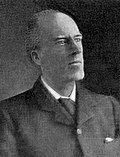
|
Karl Pearson | "For his work on the quantitative treatment of biological problems." | [10][11] |
| 1900 | 
|
Ernst Haeckel | "For his long-continued and highly important work in zoology all of which has been inspired by the spirit of Darwinism." | [12][13] |
| 1902 | 
|
Francis Galton | "For his numerous contributions to the exact study of heredity & variation contained in 'Hereditary Genius', 'Natural Inheritance', and other writings." | [14][15] |
| 1904 | 
|
William Bateson | "For his important contribution to the theory of organic evolution by his researches on variation and heredity." | [16][17] |
| 1906 | 
|
Hugo de Vries | "On the ground of the significance and extent of his experimental investigations in heredity & Variation." | [18][19] |
| 1908 | 
|
August Weismann | "On the ground of his eminent services in support of the doctrine of evolution by means of natural selection." | [20][21] |
| 1910 | 
|
Roland Trimen | "On the ground of his South African bionomic researches, in large part undertaken as the outcome of correspondence with Charles Darwin." | [22][23] |
| 1912 | 
|
Francis Darwin | "On the ground of his work in conjunction with Charles Darwin, and his researches in vegetable physiology." | [24][25] |
| 1914 | 
|
Edward Bagnall Poulton | "On the ground of his researches in heredity." | [26][27] |
| 1916 | 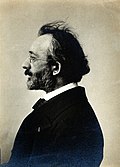
|
Yves Delage | "On the ground of researches in zoology and biology." | [28][29] |
| 1918 | 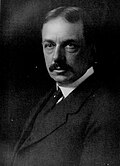
|
Henry Fairfield Osborn | "For his valuable researches on vertebrate morphology and palaeontology." | [30][31] |
| 1920 | 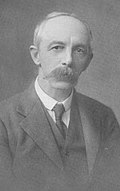
|
Rowland H. Biffen | "On the ground of his work on scientific principles applied to the breeding of plants." | [32][33] |
| 1922 | — | Reginald C. Punnett | "For his researches in the science of genetics." | [34][35] |
| 1924 | 
|
Thomas Hunt Morgan | "For his valuable work in zoology and more especially his researches on heredity and cytology." | [36][37] |
| 1926 | 
|
Dukinfield Henry Scott | "For his contributions to palaeophytology, particularly in relation to the period of coal." | [28][38] |
| 1928 | 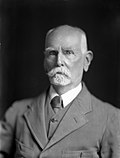
|
Leonard Cockayne | "For the eminence of his contributions to ecological botany." | [28][39] |
| 1930 | 
|
Johannes Schmidt | "For his work on extended oceanographical expeditions; and for his genetic studies in animals and plants." | [40] |
| 1932 | 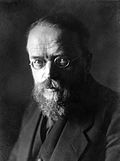
|
Carl Erich Correns | "As one of the three independent discoverers of Mendels publications; and for his distinguished researches in genetics." | |
| 1934 | 
|
Albert Seward | "In recognition of his work as a palaeobotanist." | |
| 1936 | — | Edgar Johnson Allen | "In recognition of his long continued work for the advancement of marine biology, not only by his own researches but by the great influence he has exerted on very numerous investigations at Plymouth." | |
| 1938 | 
|
Frederick Orpen Bower | "In recognition of his work of acknowledged distinction in the field in which Darwin himself laboured." | |
| 1940 | 
|
James Peter Hill | "For his contributions to the solution of problems bearing on the inter-relationships of the main groups of the Mammalia and on the phylogenetic history of the primates, a subject with which Charles Darwin himself was much concerned." | |
| 1942 | – | D. M. S. Watson | "In recognition of his researches on primitive fishes and amphibians which have much advanced the knowledge of the evolution of these groups of animals." | |
| 1944 | 
|
John Stanley Gardiner | "In recognition of his work on coral reefs and on the organisms associated with such habitats." | |
| 1946 | — | D'Arcy Thompson | "In recognition of his outstanding contributions to the development of biology." | |
| 1948 | 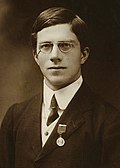
|
Ronald Fisher | "In recognition of his distinguished contributions to the theory of natural selection, the concept of its gene complex and the evolution of dominance." | |
| 1950 | 
|
Felix Eugen Fritsch | "For his distinguished contributions to the study of algology." | |
| 1952 | 
|
J. B. S. Haldane | "In recognition of his initiation of the modern phase of the study of the evolution of living populations." | |
| 1954 | – | E. B. Ford | "In recognition of his distinguished contributions to the genetical theory of evolution by natural selection, particularly in natural populations." | |
| 1956 | 
|
Julian Sorell Huxley | "In recognition of his distinguished contributions to the study and theory of evolution." | |
| 1958 | — | Gavin de Beer | "In recognition of his distinguished contributions to evolutionary biology." | |
| 1960 | – | E. J. H. Corner | "In recognition of his distinguished and strikingly original botanical work in tropical forests." | |
| 1962 | – | George Gaylord Simpson | "In recognition of his distinguished contributions to general evolutionary theory, based on a profound study of palaeontology, particularly of vertebrates." | |
| 1964 | – | Kenneth Mather | "In recognition of his distinguished contributions to knowledge of cytology and genetics." | |
| 1966 | — | Harold Munro Fox | "In recognition of his distinguished and extensive contributions in the field of invertebrate zoology and to our understanding of general biological phenomena." | |
| 1968 | — | Maurice Yonge | "In recognition of his many distinguished contributions to evolutionary biology, particularly of the mollusca." | |
| 1970 | — | Charles Sutherland Elton | "In recognition of the basic concepts he has contributed to the study of animal ecology which, with his foundation of the Bureau of Animal Population, have had international impact." | |
| 1972 | — | David Lack | "In recognition of his distinguished and numerous contributions to ornithology and to our understanding of evolutionary mechanisms." | |
| 1974 | — | Philip Sheppard | "In recognition of his outstanding work on natural populations of butterflies, describing and explaining the operation of natural selection and demonstrating the genetic basis upon which selection operates." | |
| 1976 | — | Charlotte Auerbach | "In recognition of her discovery of and continuing work on chemical mutagenesis." | |
| 1978 | 
|
Guido Pontecorvo | "In recognition of his discovery of somatic recombination in fungi which led to the elucidation of an important type of genetic variation." | |
| 1980 | — | Sewall Wright | "In recognition of his outstanding contributions to genetics and evolutionary theory." | |
| 1982 | — | Jack Heslop-Harrison | "In recognition of their major contributions to plant physiology including fundamental studies on insectivorous plants, much of this research carried out jointly." | |
| — | ||||
| 1984 | 
|
Ernst Mayr | "In recognition of his distinguished contributions to evolutionary biology." | |
| 1986 | 
|
John Maynard Smith | "In recognition of his outstanding success in combining mathematics with biology to enhance our understanding of evolution, in particular the evolution of sex." | |
| 1988 | — | W. D. Hamilton | "In recognition of his distinguished work on evolutionary theory. His contributions include the theory of kin selection to account for altruistic behaviour and the theoretical demonstration of a link between disease resistance and the evolution of sex." | |
| 1990 | 
|
John Harper | "For his research on the population biology and evolution of plants which has greatly improved understanding of the adaptation of plants to their environment." | |
| 1992 | — | Motoo Kimura | "Distinguished for his work on molecular evolution, in particular on the role of stochastic events in determining the rate of evolution." | |
| 1994 | — | Peter Lawrence | "In recognition of his analysis of pattern formation during insect segmentation, and of his contribution to understanding how genetic processes specify spatial information." | |
| 1996 | 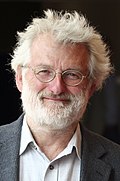
|
John Sulston | "In recognition of his leadership in the study of genome analysis with the potential to have a profound impact on the whole of biology." | |
| 1998 | — | Michael Denis Gale | "In recognition of their work on cereal genome organisation and evolution which has revolutionised cereal genetics by showing that the genetics of all the different cereals can be considered in a common framework." | |
| — | Graham Moore | |||
| 2000 | — | Brian Charlesworth | "In recognition of his distinguished work on selection in age-structured populations, extending the theory to the evolution of ageing, and testing the theories of mutation accumulation and pleiotropy, developing models for the evolution of genetic systems, including sex and recombination, inbreeding and outbreeding, separate sexes and sex chromosomes, segregation distortion and repetitive DNA." | |
| 2002 | 
|
Peter and Rosemary Grant | "for their fundamental work on the ecology, breeding and evolution of Darwin's finches on the Galapagos islands. This work has become the classic example of Darwinian evolution in the wild." | |
| 2004 | 
|
Enrico Coen | "for their ground-breaking discoveries about the control of flower development. They have combined molecular and genetic approaches to answer some of Darwins key questions about the natural variation of floral form and the evolution of floral development." | |
| — | Rosemary Carpenter | |||
| 2006 | — | Nick Barton | "for his major and extensive contributions to evolutionary biology, by the application of sophisticated mathematical analysis but focussed on developing biological understanding rather than mathematical niceties." | |
| 2008 | — | Geoff Parker | "for his lifetime contribution to the foundations and development of behavioural ecology, in particular for understanding evolutionary adaptations and their consequences for natural populations." | |
| 2010 | — | Bryan Clarke | "for his original and influential contributions to our understanding of the genetic basis of evolution." | |
| 2012 | — | Tim Clutton-Brock | "for his outstanding work on the diversity of animal societies and demonstration of their effects on the evolution of reproductive strategies, the operation of selection and the dynamics of populations." | |
| 2014 | 
|
John Sutherland | "for his novel and convincing work on prebiotic chemistry, in particular his solution to the central problem of nucleoside synthesis." | |
| 2016 | 
|
Caroline Dean | "for her work addressing fundamental questions in the perception of temperature cues and how modifications in epigenetic mechanisms play an important role in adaptation." | |
| 2018 | — | Bill Hill | "for his contribution to our understanding of the genetics of quantitative traits and response to selection" | |
| 2019 | — | Peter Holland | "for his work with many organisms and genes elucidating key aspects of how changes in the genome influence evolution of animal development" | |
| 2020 | — | Robert A. Martienssen | "for outstanding contributions to genetics and epigenetics, including defining the role of RNA interference in inherited gene silencing and in genomic stability in the germ line." | |
| 2021 | — | Dolph Schluter | "for major and fundamental contributions to the understanding of the how species originate, adaptive radiations develop, and geographical patterns of biodiversity emerge and are maintained." |
See also[]
- List of biology awards
- "Award winners : Darwin Medal". The Royal Society. Retrieved 21 July 2016.
References[]
- ^ "Darwin Medal". The Royal Society. Archived from the original on 4 March 2016. Retrieved 16 June 2016.
- ^ Bulmer, Michael (2005). "The Theory of Natural Selection of Alfred Russel Wallace FRS" (PDF). Notes and Records. Royal Society. 59 (2): 125–136. doi:10.1098/rsnr.2004.0081. ISSN 0035-9149. PMID 16116703. S2CID 42066575. Archived (PDF) from the original on 22 April 2021. Retrieved 22 January 2022.
- ^ The Encyclopædia Britannica Guide to the 100 Most Influential Scientists – The Most Important Scientists from Ancient Greece to the Present Day. Encyclopædia Britannica. 2008. p. 201. ISBN 978-1-59339-846-0. Archived from the original on 22 January 2022. Retrieved 22 January 2022 – via Google Books.
- ^ Macaulay, James; Miller, William Haig; Stevens, William, eds. (1893). The Leisure Hour. Vol. 42. W. Stevens. p. 503. Archived from the original on 22 January 2022. Retrieved 22 January 2022 – via Google Books.
- ^ Journal of Horticulture, Cottage Gardener and Home Farmer. Vol. 25. Journal of Horticulture Office. 1892. p. 483. Archived from the original on 22 January 2022. Retrieved 22 January 2022 – via Google Books.
- ^ Culverwell, Edward P. (1896). "A Criticism of the Astronomical Theory of the Ice age". Nature. 1036 (1306): 35. doi:10.1038/051033d0. S2CID 4038444. Retrieved 22 January 2022 – via the Internet Archive.
- ^ Hall, Marie Boas (1984). "The Royal Society in Thomas Henry Huxley's Time". Notes and Records. Royal Society. 38 (2): 158. JSTOR 531815. Archived from the original on 22 January 2022. Retrieved 22 January 2022.
- ^ Tyagi, B. K. (2004). The Invincible Deadly Mosquitoes. Scientific Publishers. p. 68. ISBN 9789387741300. Archived from the original on 22 January 2022. Retrieved 22 January 2022 – via Google Books.
- ^ Berti, Lucia (2018–19). Scientific Crosscurrents Between Italy and England – Italian contributions to the Philosophical Transactions of the Royal Society, 17th–19th centuries (PDF) (PhD thesis). University of Milan. p. 227. Archived (PDF) from the original on 11 May 2020. Retrieved 22 January 2022.
- ^ Knowledge. Vol. 22. Wyman-Gordon. 1917. p. 13. Retrieved 22 January 2022 – via Internet Archive.
- ^ Philosophical transactions of the Royal Society of London. Royal Society. 1896. pp. xvii. Retrieved 22 January 2022.
- ^ "Notes". Nature. Royal Society. 63 (1619): 34–39. 1900. doi:10.1038/063034a0. Archived from the original on 22 January 2022. Retrieved 22 January 2022.
- ^ "Midland Medical Union". The BMJ. British Medical Association. 1516 (2082): 1516. 1900. ISSN 0959-8138. PMC 2464136. PMID 20759293.
- ^ Galton, David J. (2001). In Our Own Image – Eugenics and the Genetic Modification of People. Little, Brown and Company. p. 87. ISBN 9780316855921. Retrieved 22 January 2022 – via Internet Archive.
- ^ Francis Galton – The Life and Work of a Victorian Genius. Taplinger Publishing Company. 1974. p. 253. ISBN 0800826825. Retrieved 22 January 2022 – via Internet Archive.
- ^ Year-book of the Royal Society of London. Vol. 9. Royal Society. 1905. p. 166. Retrieved 22 January 2022 – via the Internet Archive.
- ^ Wade, Michael J. (2009). "William Bateson: Variation, Heredity, and Speciation (Review)". Evolution. Society for the Study of Evolution. 63 (10): 2769. doi:10.1111/j.1558-5646.2009.00754.x. JSTOR 27743433. S2CID 86284443. Archived from the original on 22 January 2022. Retrieved 22 January 2022.
- ^ "The Salaries of Professors". Science. American Association for the Advancement of Science. 24 (621): 671. 1906. JSTOR 1632229. Retrieved 22 January 2022.
- ^ East, E. M. (1936). "Hugo De Vries (1848–1935)". Proceedings of the National Academy of Sciences of the United States of America. American Academy of Arts and Sciences. 70 (10): 523. ISSN 0027-8424. JSTOR 20023166. Archived from the original on 22 May 2021. Retrieved 22 January 2022.
- ^ Educational Review. . 1908. p. 534. ISSN 0190-4191. Retrieved 22 January 2022 – via the Internet Archive.
- ^ Lee, Thomas F. (2013). The Human Genome Project – Cracking the Genetic Code of Life. Springer Publishing. p. 43. ISBN 9781489960221. Archived from the original on 22 January 2022. Retrieved 22 January 2022 – via Google Books.
- ^ Year-book of the Royal Society of London. Vol. 15. Royal Society. 1911. p. 173. Archived from the original on 22 January 2022. Retrieved 22 January 2022 – via Google Books.
- ^ Fenwick, Simon (2017). A Guide to the Archives of the Royal Entomological Society. Taylor & Francis. p. 66. ISBN 9781351962476. Archived from the original on 22 January 2022. Retrieved 22 January 2022 – via Google Books.
- ^ Year-book of the Royal Society of London. Vol. 17. Harrison and Sons. 1913. p. 177. Archived from the original on 22 January 2022. Retrieved 22 January 2022 – via Google Books.
- ^ Cattell, J. McKeen (1913). The Popular Science Monthly. Vol. 82. The Science Press. p. 104. Archived from the original on 22 January 2022. Retrieved 22 January 2022 – via Google Books.
- ^ Year-book of the Royal Society of London. Vol. 19. Harrison and Sons. 1915. p. 174. Archived from the original on 22 January 2022. Retrieved 22 January 2022 – via Google Books.
- ^ Salmon, Michael (2021). The Aurelian Legacy – A History of British Butterflies and Their Collectors. Brill Publishers. p. 188. ISBN 9789004475472. Archived from the original on 22 January 2022. Retrieved 22 January 2022 – via Google Books.
- ^ a b c "Darwin Medal". Royal Society. Archived from the original on 5 December 2021. Retrieved 22 January 2022.
- ^ "The Royal Society". The Guardian. 16 November 1916. p. 3. Archived from the original on 22 January 2022. Retrieved 22 January 2022 – via Newspapers.com.
- ^ J., Strachan (1919). Nature – A Weekly Illustrated Journal Of Science. Vol. 102. Macmillan Publishers. p. 229. Retrieved 22 January 2022 – via Internet Archive.
- ^ Woodward, A. Smith (1936). "Henry Fairfield Osborn. 1857–1935". Obituary Notices of Fellows of the Royal Society. Royal Society. 2 (5): 71. JSTOR 769129. Archived from the original on 22 January 2022. Retrieved 22 January 2022.
- ^ Year-book of the Royal Society of London. Vol. 25. Harrison and Sons. 1925. p. 154. Archived from the original on 22 January 2022. Retrieved 22 January 2022 – via Google Books.
- ^ "The Year's Medals". The Times. 1 December 1920. p. 14. Archived from the original on 22 January 2022. Retrieved 22 January 2022 – via Newspapers.com.
- ^ "Chemistry at the Boston Meeting of the American Association". Science. 56 (1457): 629. 1922. ISSN 0036-8075. Retrieved 1 February 2022 – via Internet Archive.
- ^ Year-book of the Royal Society of London. Vol. 27. Harrison and Sons. 1923. p. 158. Retrieved 1 February 2022 – via Google Books.
- ^ Year-book of the Royal Society of London. Harrison and Sons. 1925. p. 168. Retrieved 2 February 2022 – via Google Books.
- ^ The Renaissance of Science {{subst:endash}} The Story of the Cell and Biology : The Magnificent Scientists and Their Fabulous Accomplishments, a Fantastic Dream and Journey Into the Past, Present and Future in the World of Biology. Abbott Communications Group. 2015. p. 488. ISBN 9780692485125. Retrieved 2 February 2022 – via Google Books.
- ^ Jones, C. (2009). Femininity, Mathematics and Science, 1880–1914. Palgrave Macmillan. p. 126. ISBN 9780230246652. Retrieved 2 February 2022 – via Google Books.
- ^ Year-book of the Royal Society of London. Vol. 33. Harrison and Sons. 1929. p. 168. Retrieved 2 February 2022 – via Google Books.
- ^ Chemical News and Journal of Industrial Science. Vol. 141–142. London Chemical news Office. 1930. p. 397. Retrieved 2 February 2022 – via Google Books.
External links[]
- Awards established in 1890
- Awards of the Royal Society
- Biennial events
- Biology awards
- Charles Darwin
- 1890 establishments in the United Kingdom
- 1890 in biology